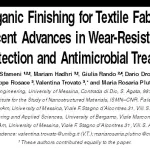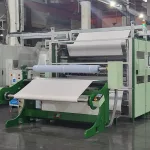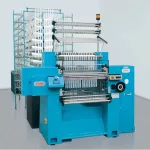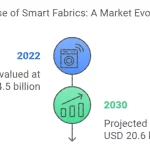I. KRUCINSKA, B. SURMA, M. CHRZANOWSKI, E. SKRZETUSKA, M. PUCHALSKI
Department of Material and Commodity Sciences and Textile Metrology, Faculty of Material Technologies and Textile Design, Technical University of Lodz, Poland
The aim of research was to elaborate the melt – blown technology for manufacturing temperature and chemical vapours sensor non-woven
fabrics. In the first case the sensor properties were achieved by application the optimal composition of immiscible polymer blends PCL/PP loaded with multi-wall carbon nanotubes (MWCN). Different polymer compositions were subjected to melt blowing process changing the proportion of matrix polymer PP to dispersed phase PCL/MWCN.Obtained non-woven fabrics were characterised by measuring their electrical properties as a function of changes of temperature in the range of 20-80 °C. As studied, the 70%PP/28,8%PCL/1,2%MWCN non-woven fabrics show the best sensitivity to changes of temperature on the level of 50-60 °C. In the second case the melt blown smart nonwovens were obtained using PLA/MWCN. PLA 4060D delivered by Nature Works Company was melt mixed in two stage process with carbon nanotubes Nanocyl7000 in order to obtain PLA/ 2%MWCN composition. Non-woven fabrics made of this composite were characterised by measuring the changes of their electrical resistance to vapour of benzene, toluene, acetone and methanol. As studied, the PLA/MWNT fabrics manufactured under the optimal conditions show good sensitivity over multiple testing cycle.
Back to the Abstracts of the
4th Intl Conference “Smart Materials, Structures and Systems”





